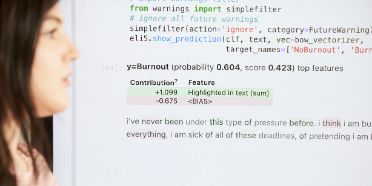Main areas of study
Data-based medicine and user-friendliness of smart applications in hospitals, medical practices or private households are two of our focal points. The basics: Medicine, Informatics, Design and Processes.
What you will gain your degree
You design forward-looking IT and digitalisation solutions for our healthcare system, and you build and implement prototypes. In the course of your practice-based studies, you will have an exclusive access to our Living-Lab, unique in Switzerland, which includes all stations of the healthcare system.
Your future professional activities are in project management teams or in the management and development of medical applications.
Your employers are hospitals, industry, public authorities, and consulting offices.
Programme overview
Final-Year Theses 2024 – Book
The book presents the results of this focussed and future-oriented degree programme. The abstracts of the Bachelor's theses make it clear that Bachelor's graduates in Medical Informatics have acquired skills in informatics and eHealth, management and organisation, medicine and digitalisation in the healthcare system. Take a look; it's worth it!









